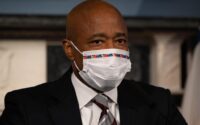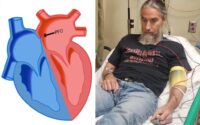NYC schools ‘not equipped’ to support student mental health: audit
New York City public schools are “not equipped” to support students’ mental health — and previously misled parents about what programs are available to kids in need, according to a report by the state comptroller released Thursday.
The four-year audit found that the Department of Education lacks the staff and training to support the wellbeing of students, and also has not been ensuring that they learn about mental health, as required by state law.
“While DOE has shown a willingness to confront these issues, many of New York’s school children still face a mental health emergency, and schools are not equipped to provide them with the support they need,” said Comptroller Thomas DiNapoli in a statement.

Auditors found the agency is flouting state law, passed in 2018, that mental health instruction be part of curriculum — and does not monitor if schools meet minimum requirements or assess effectiveness.
At the beginning of the audit period, the DOE also said online that one of six mental health programs is available at each school — a claim the comptroller said was false.
Close to 40% of the public schools did not have even one of those programs, auditors found. Many of those schools are in Manhattan’s District 2 and Staten Island’s District 31, two of the largest in the system.


The DOE has corrected misleading information on its website in response to the audit, according to the report.
In response to the findings, First Deputy Chancellor Daniel Weisberg maintained that the DOE is in compliance with the law, while conceding that mental health lessons as part of health education is not tracked as a separate subject.
Students also have access to central DOE programs and screeners focused on social emotional skills, officials added.
Naomi Peña, a mom of our four children, told The Post she wishes city health professionals and schools did a better job teaching parents about mental health and recognizing symptoms.
One of her kids has been struggling with mental health, and refusing to go to school, she said. That turned into panic attacks and weight loss at the idea of going to class and six months ago, the student needed to be hospitalized.
“For me personally, I wish the DOE would be more proactive, creating guidance for schools,” she said.
The audit, which covers the period through last spring, also found that many city schools were lacking social workers.
More than 400 of the some 1,600 schools had no social workers, according to 2020-21 school year data. And 80% of schools that do have social workers fall short of the staff-to-student ratio recommended by the National Association of Social Workers — one social worker for every 250 students, the auditors found. The comptroller’s calculations do not include guidance counselors, who are also mental health professionals.
Education officials claimed the figures are “out of date,” and that each school has at least one mental health professional of different certifications.
There are also social workers at the district level, available to schools without them, the officials said. The audit, citing the city’s Independent Budget Office, says that number still falls short of putting a full-time social worker in each school.
Schools like John Bowne High School in Flushing had just one social worker for more than 3,400 students, the report found. Also in Queens, more than 1,200 middle school students at I.S. 238 Susan B. Anthony were assigned a social worker available less than part-time.
Peña, the public school mom, said she was appreciative of her family’s school, which was understanding and didn’t report her for the number of absences. But that the school could only do so much.
“They were checking in, but once the child is at that level of crisis, there’s no school counselor or social worker who can support that crisis — they’re too far gone,” she said.
“At a time when the COVID-19 pandemic has exacerbated a worsening mental health crisis among youth in New York State, the DOE should step up efforts to improve oversight of public schools’ mental health curriculum and equip school staff with the resources they need to support students’ emotional wellbeing,” DiNapoli said.
The DOE offers mental health trainings for teachers and other school staff — but attendance has been low at those lessons, the comptroller found at sampled schools.

Only three staffers from two of the 15 schools sampled — Eleanor Roosevelt High School on the Upper East Side and P.S. 197 John B. Russwurm in Harlem — attended a suicide prevention training during the years of the auditor, the comptroller found.
Education officials said staffers attend other mandated trainings that serve similar purposes.
“Our commitment to supporting our students and school communities through difficult times and beyond is unwavering,” said Suzan Sumer, a spokesperson for the DOE.
“It’s our ongoing priority to provide the critical resources needed to ensure that every school has access to a mental health professional, such as a School Social Worker or School Guidance Counselor, meeting students where they are with the supports they need, when they need them,” she added.


